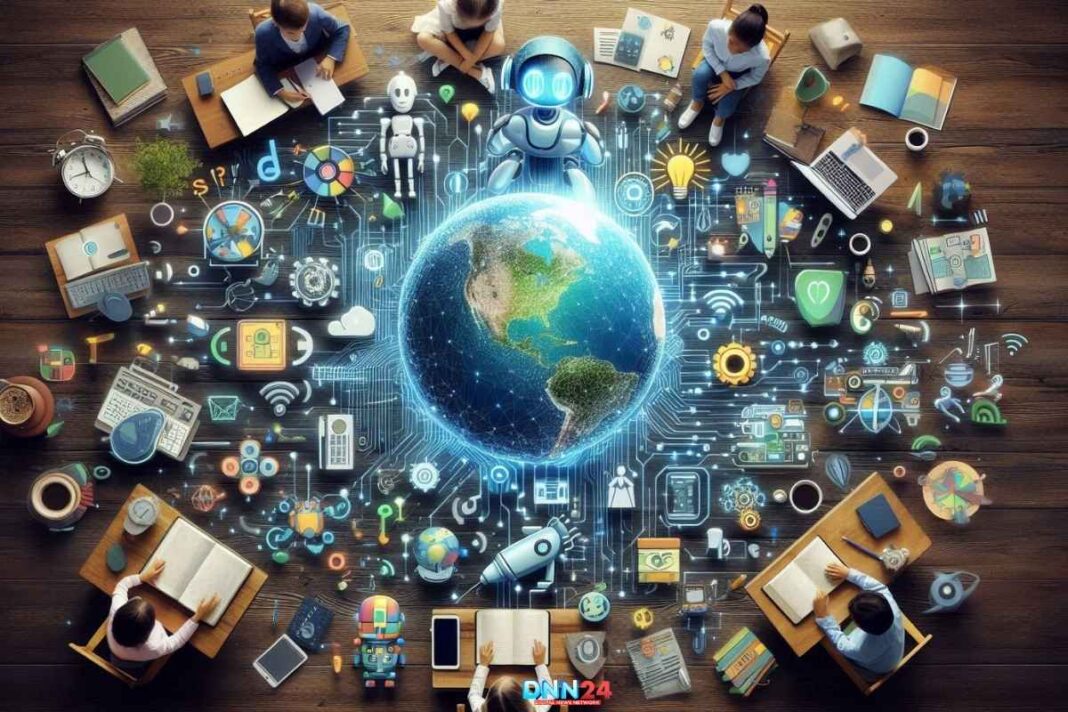January 24, 2025, marks the International Day of Education, which falls under the theme “AI and education: Preserving human agency in a world of automation.” The theme invites critical evaluation of the ways AI interacts with education and strongly calls for the retention of human agency in a more automated world. Since AI technologies continue to penetrate into everyday educational systems, research into the implications of these technologies on learning, teaching, and the overall educational experience is crucial.
The Emergence of AI in Learning
Artificial intelligence is becoming a huge part of education, especially in rich countries. More than two-thirds of the students at secondary school already use AI tools to do their schoolwork. Teachers also use AI in planning lessons and checking the work done by the students. Even admissions and guidance to school, which used to be conducted by teachers and experts, are now influenced by AI.
The integration of AI in learning promises both promising opportunities and significant challenges. A UNESCO survey from May 2023 reported that only 10% of schools and universities have set up official frameworks for AI usage, showing how Initial the adoption of AI is in educational settings. The global landscape of AI in teaching reveals significant inequalities: by 2022, only seven countries had developed AI programs for teachers, and only 15 had included AI training in their national curricula.
At the same time, there is a trend of digital regulation, with almost 40% of countries adopting laws that ban or restrict mobile phone use in schools, up from 24% six months ago. These statistics highlight the complex dynamics surrounding the integration of technology into education. Despite these challenges, AI’s potential remains compelling. It offers personalized learning experiences, can automate administrative tasks, and provides data-driven insights into student performance.

Looking forward to 2025, the role of AI in education is expected to expand, as smart tutoring systems and adaptive learning technologies are to be developed that will accommodate the diverse learning styles. The biggest challenge is in developing comprehensive, ethical guidelines to maximize the benefits of AI in education while minimizing the risks.
Current Statistics on AI Application in Learning
The learning field is changing in a rapid sequence due to influence from AI. Recent statistics give an insight about this change in the education scene:
The market for AI education technology was estimated to be $3.925 billion in 2023 and had a huge projection for the next ten years.
More than 89% of students confirm using ChatGPT for completing homework, according to a current report.
More than 58% of college teachers use generative AI in their teaching activities, which shows how widely it is being accepted among educators. The majority of the teachers, that is, 72%, fear plagiarism and cheating due to the presence of generative AI in classrooms. These figures show the extreme effects of AI on both learners and instructors as it changes the way knowledge is learned and measured.
The integration of AI in education demands a nuanced, ethical approach that balances technological potential with human-centered principles. UNESCO emphasizes the importance of using AI to supplement, not replace, human teachers, while ensuring robust guidelines for responsible implementation. Critical infrastructure challenges remain significant: one in four primary schools lack electricity, and 60% are not internet-connected, underscoring the need for strategic resource allocation.

Ethical Use of AI and Human
Key ethical considerations are: clear protocols for teacher training, protection of student data, system transparency, and inclusiveness. UNESCO advocates that there be a minimum age of 13 years to be allowed the use of AI tools in classrooms. It further supports the balanced use of AI’s benefits without causing any form of inequality in education. The organization urges governments to invest in the development of AI without diverting such funds from other necessary educational services.
By the International Day of Education in 2025, the focus is on preserving human agency, ensuring AI serves as an empowerment tool rather than a controlling mechanism. This approach requires careful navigation of technological integration, with a commitment to addressing existing educational inequalities and leveraging AI’s potential to create more personalized, accessible learning experiences.
The Future of Education with AI
The International Day of Education 2025 emphasizes the transformative potential of AI in education while underlining the critical importance of preserving human agency. UNESCO and global educators are navigating this complex landscape with widespread technological progress changing the learning environment fast.
Current data indicate that significant challenges stand in the way of adopting educational technology. For instance, only 10% of schools and universities have established officially approved usage frameworks for AI, and by 2022, only seven countries have developed AI programs for the teachers. Not with standing such limitations, AI brings promising opportunities for personalized learning, administrative efficiency, and data-driven educational insights.

Ethical considerations are not lost in the shuffle. Suggestions include a minimum age of 13 for AI classroom tools, safeguarding student data, ensuring transparency, and keeping AI as a supplement and not a replacement for human teachers. This is critical, especially when one in four primary schools do not have electricity and 60% do not have internet access.
The objective is to develop an educational ecosystem in which technology serves to amplify, rather than dilute, human interaction. Students are thus prepared for a world increasingly automated but in which the very essence of learning remains fundamentally human: empathetic and critical.
Also Read: Maha Kumbh Mela: A Grand Festival of Faith and Unity
You can connect with DNN24 on Facebook, Twitter, and Instagram and subscribe to our YouTube channel.



